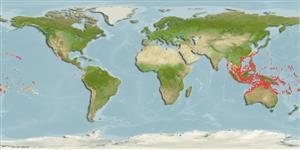Common names from other countries
>
Acanthuriformes (Surgeonfishes) >
Acanthuridae (Surgeonfishes, tangs, unicornfishes) > Acanthurinae
Etymology: Acanthurus: Greek, akantha = thorn + Greek, oura = tail (Ref. 45335).
More on author: Linnaeus.
Environment: milieu / climate zone / depth range / distribution range
Ecología
marino asociado a arrecife; rango de profundidad 0 - 67 m (Ref. 1602), usually 2 - 67 m (Ref. 27115). Tropical; 21°C - 29°C (Ref. 27115); 30°N - 24°S
Eastern Indian Ocean: known only from Cocos-Keeling Islands and Christmas Island. Pacific Ocean: Ryukyu Islands and Great Barrier Reef to the Hawaiian Islands and French Polynesia (excluding Rapa). This species has crossed the Eastern Pacific Barrier to the Revillagigedo Islands, Cocos Island, Galapagos Islands, and the coast of Mexico.
Tamaño / Peso / Age
Maturity: Lm ? range ? - ? cm
Max length : 36.0 cm FL macho / no sexado; (Ref. 125599); peso máximo publicado: 620.00 g (Ref. 125599); edad máxima reportada: 34 años (Ref. 52229)
Espinas dorsales (total) : 9; Radios blandos dorsales (total) : 28 - 31; Espinas anales: 3; Radios blandos anales: 26 - 28. A horizontally elongate white blotch directly below eye. No orange band in outer part of dorsal fin. Caudal peduncle black except for yellow edge of socket and sheath of peduncular spine. Base of pectoral fin black (ref 9808).Gill rakers on anterior row:17-19, on posterior row:18-20.
Adults inhabit hard substrate areas of clear lagoon and seaward reefs from the lower surge zone to at least 67 m and feeds on filamentous algae. Solitary or in groups (Ref. 90102). Monogamous (Ref. 52884, 48637). Benthopelagic (Ref. 58302). Small juveniles shy among large corals (Ref. 48637). Territorial species. Common throughout Micronesia and hybridizes with the rare A. achilles. Size of metamorphosis from the postlarva stage to juvenile is 5.5 to 6 cm (Ref. 9267). Minimum depth reported taken from Ref. 128797.
Life cycle and mating behavior
Maturities | Reproducción | Spawnings | Egg(s) | Fecundities | Larva
Monogamous mating is observed as both facultative and social (Ref. 52884).
Myers, R.F., 1991. Micronesian reef fishes. Second Ed. Coral Graphics, Barrigada, Guam. 298 p. (Ref. 1602)
IUCN Red List Status (Ref. 130435)
CITES (Ref. 128078)
Not Evaluated
Threat to humans
Harmless
Human uses
Pesquerías: pesquerías de subsistencia; Acuario: Comercial
Herramientas
Special reports
Download XML
Fuentes de Internet
Estimates based on models
Preferred temperature (Ref.
115969): 24.5 - 28.8, mean 27.4 (based on 650 cells).
Phylogenetic diversity index (Ref.
82804): PD
50 = 0.5000 [Uniqueness, from 0.5 = low to 2.0 = high].
Bayesian length-weight: a=0.02630 (0.01489 - 0.04645), b=2.93 (2.78 - 3.08), in cm Total Length, based on LWR estimates for this species & Genus-body shape (Ref.
93245).
Nivel trófico (Ref.
69278): 2.0 ±0.00 se; based on food items.
Resiliencia (Ref.
120179): Medio, población duplicada en un tiempo mínimo de 1.4-4.4 años (K=0.28; growth and reproduction as expected for Medium; tmax=34 observed only in deep water (RF)).
Fishing Vulnerability (Ref.
59153): Low to moderate vulnerability (30 of 100).
